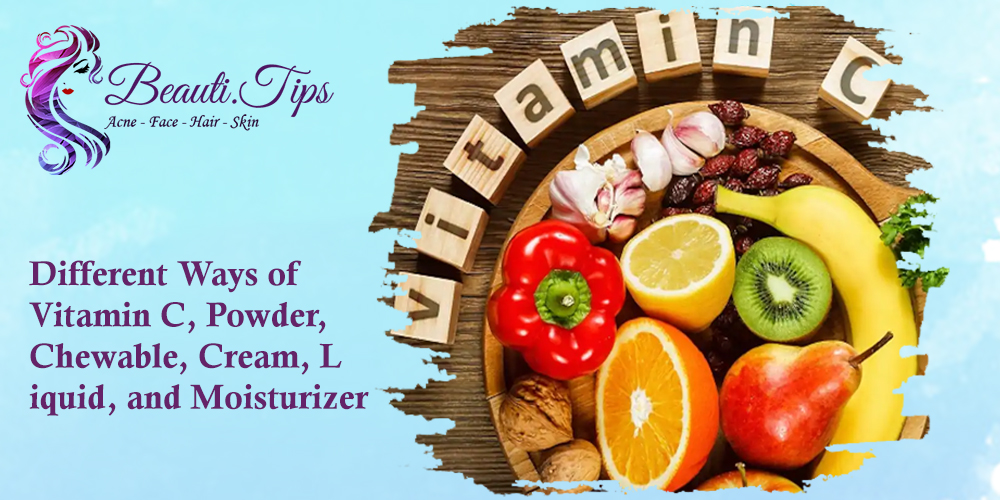Different Ways of Vitamin C mostly found in fruits and vegetables.
Natural vitamin C: definition and origin
Vitamin C is said to be natural when it comes directly from food. In other words, when it is not “synthetic”. It is water-soluble: it is, therefore, soluble in water. It is mainly found in fruits and vegetables, but also in certain berries such as sea buckthorn and rosehip. As the human body cannot synthesize it, it is recommended to consume it daily.
Role and benefits of vitamin C
Vitamin C allows the formation of collagen, an essential element for the formation of bones but also of cartilage, connective tissue, and skin. Because it strengthens the immune system, it makes it easier to resist infections. It improves the healing process, promotes the absorption of the iron contained in plants, and participates in the formation of red blood cells.”
It also has antioxidant properties that help us protect our cells from free radical damage, prevent cardiovascular disorders, certain cancers like lung, skin, and breast cancers, as well as eye diseases like cataracts and Related Macular Degeneration in the Age “, adds Florence Foucault.
Daily intake
The Recommended Daily Allowances (RDI) of vitamin C are 110 mg for an adult, 100 mg for a child, and 120 mg for a pregnant woman and an elderly person. If you are a smoker, your needs increase to 130 mg, because each cigarette “burns” 25 mg of vitamin C! But some nutritionists recommend an RDA of 200 mg.
Different Ways of Vitamin C to Intake
Vitamin C powder
The vitamin C is certainly very beneficial to our health (including its antioxidant properties), but it is not always easy to find with a good price/quality ratio. For many, this is the main reason to turn to powdered vitamin C. But it still has to be effective, because vitamin C powder is best known for being much less concentrated than effervescent tablets, but also liposomal forms.
To help you sort through the many brands sold in France, I offer my advice for choosing your vitamin C powder. As well as the reasons why you may decide to favor this dosage form over another.
Read also: 10 Drinks to Boost Your Immunity
What are the benefits of vitamin c powder?
Supplementing with vitamin C can be relatively expensive. Indeed, the vast majority of vitamin C-based products (tablets, but also local solutions such as anti-ageing creams and serums) are very expensive. It is all the more frustrating that they are not necessarily more effective.
They can even be dangerous since it is now known that overdose of vitamin C is harmful to the human body.
Vitamin C powder can be a solution to both of these problems since it is often much cheaper. But also, less concentrated in vitamin C. Let’s make a brief summary of its advantages:
How to use vitamin c powder?
There are many ways to use powdered vitamin C. The most obvious is of course to dilute it in a glass of water. If this is the option you choose, consider dosing your daily intake well to avoid possible side effects. We generally recommend between 500 mg and 1 gram to avoid deficiencies and fully feel the benefits of vitamin C.
And up to 5 g in case of treatment against cancer or AIDS.
But that’s not the only way you can use your Vitamin C powder. Indeed, rather than breaking the bank on an anti-ageing cream, all you need to do is make a homemade one by adding a spoonful. of vitamin C.
You can also prepare:
- atoner (with a teaspoon of vitamin C powder and a tablespoon of distilled water);
- an anti-ageing serum (with glycerin and rose water);
- A revitalizing mask based on water or aloe vera gel.
In which cases to use it?
Here are some cases where vitamin C may be helpful:
- for people deficient in vitamin C
- for tired people
- for sick people (infectious diseases, colds …)
- for people with allergies
- for stressed, anxious, depressed, insomniac …
- for people with toxicology problems
- for people undergoing chemotherapy or radiation therapy
Read also: 6 Exercises to Reduce Knee Pain
Vitamin c chewable
Description
Vitamin C Chewable Tablet is used for Red blood cell production, Wound healing, Cell damage, Tissue repair, Scurvy and other conditions.
Experiment
Vitamin C Chewable Tablet is used for the treatment, control, prevention, & improvement of the following diseases, conditions and symptoms:
- Red blood cell production
- heal wounds
- Cell damage
- Tissue repair
- Scurvy
Side-effects
The following is a list of possible side-effects that may occur from all constituting ingredients of Vitamin C Chewable Tablet. This is not a comprehensive list. These side effects are possible, but not always. Some side effects may be rare, but severe. If you notice any of the following side effects, and if they do not end, consult your doctor.
- Skin redness or redness of the skin
- Stomach upset
- Surface or lower back pain
- Diarrhoea
- nausea or vomiting
- Stomach cramps
- Headache
Precautions
Before using this medicine, tell your doctor about your current medications, the following products (eg: vitamins, herbal supplements, etc.), allergies, pre-existing diseases, and current health conditions (eg: pregnancy, upcoming surgery, etc.) provide information. Certain health conditions may make you more susceptible to the side effects of the drug.
Take the medicine according to your doctor’s instructions or follow the instructions printed on the product. The dosage is based on your condition. If your condition does not improve or if your condition worsens, tell your doctor. Important counselling points are listed below.
- Drink lots of fluids
- Do not take this medicine if you are allergic to it
Interactions with Vitamin C Chewable Tablet
If you take other drugs or over the counter products at the same time, the effects of Vitamin C Chewable Tablet may change. This may increase your risk of side effects or because of this, your medicine may not work well. Tell your doctor about all the medications, vitamins, and herbal supplements you are using, so that your doctor can help you avoid the side effects of the drug. Vitamin C Chewable Tablet may interact with the following drugs and products:
- Deferoxamine
- Elemental iron
- Fluphenazine
- Hormonal contraceptives
- Warfarin
When not to use Vitamin C Chewable Tablet
Hypersensitivity to Vitamin C Chewable Tablet is a contraindication. In addition, Vitamin C Chewable Tablet should not be taken if you have the following conditions:
- Pregnant
- Allergic reactions
- Feeding the Beast
Vitamin C creams
Fighting pigmentation hard? Do you want your skin to be firmer, firmer, and more radiant? Then you need a cream with vitamin C. We will help you figure out how to choose and use it.
Read also: Does Vitamin C Cause a Miscarriage?
Vitamin C face creams for a healthy glow
Face cream with vitamin C has a remarkable effect on the beauty of the face: it stimulates cell regeneration, deeply restores and whitens the face, has a tightening and moisturizing effect.
What type of skin do you need a vitamin C cream for?
“Skin type is not the main criterion when choosing a product with vitamin C. In the composition of cosmetics, this ingredient solves problems, regardless of whether your skin is dry or oily,” comments Alexey Mironenko.
Dry skin
For dry skin owners, it is better to invest in creams that contain hyaluronic acid and lipids in addition to vitamin C. This will give you good hydration, restoring the lipid barrier and a radiant complexion.
Oily skin
In the case of oily skin, vitamin C will accelerate cellular renewal, improve complexion and skin texture. It will also help prevent troubles such as pimples and comedowns.
Combination skin
For this skin type, vitamin C is a godsend. It keeps the skin healthy by protecting it from free radicals. Poor ecology, stress, lack of sleep and other “delights” of life in a metropolis cream with vitamin C perfectly neutralize.
Hypersensitive skin
Wearers of this type of skin should be careful when choosing a treatment with vitamin C. Without marking “for sensitive skin”, such products can cause redness on skin prone to irritation.
Who Shouldn’t Use Vitamin C Cream?
Any cosmetics have their own contraindications. Cosmetics with ascorbic acid in the composition should not be used under the following conditions:
- Severe damage to the skin: scratches, wounds, burns.
- An abundance of inflammatory elements on the face.
- Frequent allergy to makeup and makeup.
What are the benefits of vitamin C moisturizer (cream)?
As we all know, taking vitamin C can boost the immune system and help maintain the proper functions of the body. But many people don’t know that this nutrient also has the effects of delaying ageing, softening, and protecting the skin. Topical vitamin C can also lighten the skin areas affected by pigmentation, treat ultraviolet radiation damage, and reduce inflammation.
Many anti-ageing creams and moisturizers contain vitamin C because it is an antioxidant ingredient. Clinical trials have confirmed that this vitamin can delay signs of ageing. Vitamin C moisturizing cream helps eliminate common problems such as age spots, fine lines, and wrinkles. It also increases the production of collagen, a protein that makes the skin firm. This is why many dermatologists recommend the use of topical vitamin C.
Many sunscreen formulas also contain vitamin C because it protects the skin from harmful ultraviolet rays. This vitamin also helps offset the adverse effects of pollutants and chemicals. Many people use vitamin C moisturizer on the face and neck, but it can also be used on the skin of the arms, legs, chest, back, and abdomen. Eating foods rich in vitamin C can help reduce swelling and inflammation, and these benefits also apply to vitamin C moisturizers.
Vitamin C-containing moisturizers can protect against inflammation related to sleep deprivation, poor eating habits, and diseases. Some cosmetics companies also combine vitamin C with tea extracts to better fight inflammation. Moisturizers should be used at least twice a day to get the most benefit from this antioxidant.
Factors such as chemotherapy, frequent X-rays, or exposure to nuclear materials can cause radiation damage. Side effects of radiation damage include nausea, mouth ulcers, and redness, swelling, and itching of the skin. Topical vitamin C can relieve skin irritation associated with radiation damage and promote the skin healing process.
Medical research and clinical trials have confirmed that topical vitamin C has many health benefits. This antioxidant can reduce wrinkles and lighten facial pigmentation. In addition, the effects of vitamin C on collagen synthesis, inflammation, and UV damage have also been proven to be beneficial. Some studies have also found that vitamin C can reduce acne, but more research is needed to confirm its benefits.

